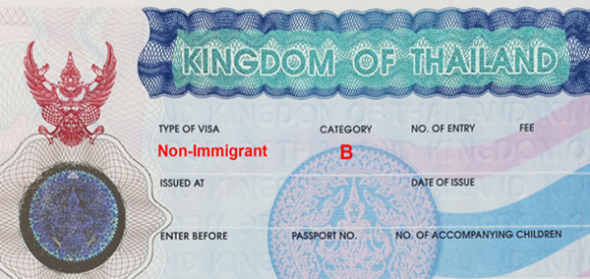Do you need a university degree to get a Non-Immigrant B visa in Thailand?

Many non-Thais wanting to work in or being offered jobs in Thailand wonder about one question.
Do they need a university degree to get a Non-Immigrant B visa in Thailand?
After all, without access to a Non-Immigrant B visa, they cannot legally work in the country.
So, do you need a university degree to get a Non-Immigrant B visa in Thailand and, if so, under what circumstance?
When is a Non-Immigrant B visa required?
The Non-Immigrant B is a business visa, and is issued to those planning on doing any kind of business in the kingdom.
Thai authorities state that this is required for those who wish:
To conduct business, to work, to study teaching course, to work as an English teacher, to take scuba diving or boxing lessons, to work as a sport coach, to do an internship, to work as a film-producer, journalist or reporter for a short period.

When is a university degree required for a Non-Immigrant B visa?
In most cases, a university degree is not required in order to be issued with a Non-Immigrant B visa.
It is usually only required if you will be teaching in Thailand, as Thai regulations now state any teacher working in a Thai school must have a Bachelors degree or the equivalent certification.
However, not every teacher is required to have a university degree in order to be issued a Non-Immigrant B visa for the purposes of teaching either.
This is because ‘equivalent certification’ (a diploma or teaching certification), which is often at the discretion of the Thai authorities as to what that can be, is often enough.
It also sometimes depends on how much your school is willing to push for you to be given the Non-Immigrant B visa and, thus, be issued a work permit.
If they are willing to go to bat for you, chances are you will be given the Non-Immigrant B visa. Even without a Bachelors degree. If they are not, chances are you won’t.

When is a university degree NOT required for a Non-Immigrant B visa?
A university degree is not required to be awarded a Non-Immigrant B visa if you will be doing business in Thailand, working for a company, or taking scuba or boxing lessons.
One is also not usually required to work as a journalist, a film-producer, to do an internship or to be a sports coach.
You may be required to have a university degree to take a teaching course in Thailand (I know of one person who was denied a visa as they did not have a university degree), but that also seems to be a rare event.
Especially if you will not be teaching in Thailand once you have completed the course.
For most types of job in Thailand that are not education-related, you will simply need to provide the usual paperwork (passport, recent photographs, visa fee, application form etc.), and things like letters of recommendation from past employers, and proof that you have the work experience you say you do.
They may also ask for proof you have completed a training course, completed an apprenticeship or other certification but, again, this also seems to be on a case by case business.
So, if you are worried that you want to look for a non-teaching job in Thailand, or have just accepted a job, and think you may need a university degree in order to be able to work there, don’t worry, you will not.
For more in-depth information about obtaining a Non-Immigrant B visa in Thailand, read the Ministry of Foreign Affairs’ information.
More reading: Is it possible to convert a tourist visa to a Non-Immigrant B visa for the purposes of work?
